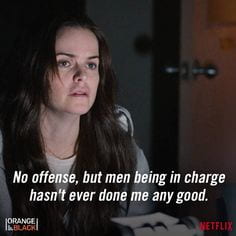
Suppressing the Jess
Jess’s awkwardness and eccentricity is what makes her unique and more relatable as a character because of her multifaceted personality. She isn’t perfect, and her flaws and insecurities often mirror what we see in ourselves. While the other roommates’ lack of full acceptance had been hinted at in previous episodes, their expectations for Jess are more thoroughly explored in episode three.
The premise of episode three is that the roommates will be attending a wedding. However, the issue is that Nick’s ex-girlfriend Caroline will also be attending. Through various flashbacks, we understand that Nick is still deeply attached to Caroline and can’t seem to let her go. His attachment is borderline unhealthy and imitates the trope of a clingy (ex-)girlfriend who constantly wants some sort of attention and can’t seem to move on. Jess is brought along as his date, but Nick refuses to let her be herself, which Jess reluctantly agrees to, jokingly stating the phrase, “suppress the Jess”.
The theme of the episode is how Jess preserves her eccentricity and continues to be herself in face of judgment and lack of support from those close to her. Schmidt wants to hook up with Brooke, Nick wants to reconnect with Caroline, and meanwhile Winston gets into a competition with a child. Each of the guys wants something different from the wedding, but Jess doesn’t have the ability to accommodate them all and nor should she have to. She becomes just a tool for the guys to achieve their desires, yet they blame her when things fall through. This situation is especially evident when Jess tries to fix Nick’s renewed fixation with Caroline but ends up scaring off Brooke from Schmidt. One girl can’t do it all, and Jess finally realizes that in a symbolic move when she takes her fake teeth back to finally have fun at the wedding, which was all she wanted out of the event. Besides being a symbol of her eccentricity, her fake teeth also represent her autonomy and power as a person since we lose them when we are not fully able to care for ourselves.
Intertwined with the main theme of the episode and interspersed throughout other episodes are threads of traditional masculinity versus femininity. Schmidt’s characterization is often the most blatant portrayal of flipping the script on what is traditionally considered masculine versus feminine. Schmidt used to be “Fat Schmidt,” with body image issues often being portrayed in media as solely an issue for women. While coming on too strong in his conversations with Brooke, Schmidt has an entirely different relationship with Gretchen with her being assertive while he is more submissive. In fact, he is essentially being used for his body like women tend to be portrayed in media with Gretchen having little interest in pursuing an actual relationship with him.
Pobody’s nerfect, and through the events in episode three, Jess grows as a person to reach self-acceptance and fulfillment, which redefines her future relationship with her roommates.








